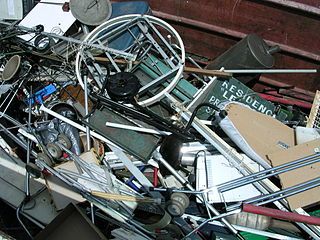From Guest Blogger Anne Staley: Metal Scrap – Dispose or Recycle?

The Big Question – Dispose or Recycle?
Isn’t it much easier to just toss metal junk than to take it to a scrap metal management facility where it can be melted and recycled? But what many people don’t realize is the harmful effect scrap metal waste can have on the environment. Metals are earth’s finite resources – they’re mined from ores which are in limited supply. But at the same time, they have an indefinite lifespan, meaning they can be reused over and over again, and recycled countless times.
Conservation of fossil fuels
Drilling and mining for ores requires expensive machinery and may result in tremendous loss of water. The mined metal must be taken to a processing unit which could be located thousands of miles away. That involves use of petroleum and diesel, which are again limited in supply, and the use of which results in emission of greenhouse gases, increasing air pollution and intensifying our carbon footprint.
Saving trees
When you don’t drill into the earth’s surface, you prevent erosion of land. Soil erosion is responsible for wiping away trees and forests. So by avoiding digging into the earth, you save hundreds of acres of forests and help reforestation.
Avoid water and land pollution
When we dispose metal items without giving it a second thought, we fail to realize that the chemical substances contained within these things might pose a severe risk to the environment. Automobile parts contain petrol, diesel, brake fluids, coolants and other harmful chemicals which can leach into lakes, rivers, and oceans, contaminating them. This can prove disastrous for aquatic life and even harm people who are regular swimmers.
Preserving space
When you avoid throwing away scrap metal, you contribute to saving space by reducing landfills. Dumped rubbish in landfills is dangerous; it can emit poisonous gases and even contaminate groundwater. Not to mention that landfills are such an eyesore!
Here are some interesting facts and figures about scrap metal recycling1 that will help you realize that recycling is a far better option than just throwing away that metal scrap you had:
- When you recycle one ton of aluminum, you conserve 8 tons of bauxite, 6300 liters of soil, and 7.6 cubic meters of landfill.
- Recycling copper reduce carbon dioxide emissions by 65%!
- Recycling a ton of steel, the world’s most recycled material, saves 2500 pounds of iron ore, 1400 pounds of coal, and 120 pounds of limestone.2
Scrap metal recycling is a huge industry, and almost every city in every state, right from San Francisco CA to Richmond VA have scrap metal recycling facilities. There are several organizations, like SIMS Metal Management which will welcome anyone willing to recycle scrap metal and also pay you a good price for it! So the next time you have some items that have to be discarded think for a moment. It may be of no use to you. But it could hold immense value for a scrap yard dealer. It might be daunting taking it to a junkyard for recycling because let’s face it, junkyards, brimming with seemingly endless piles of scrap, often resemble ultimate doom, straight like a scene out of the movie WALL-E! And that’s what might eventually happen to our planet, if we don’t consciously recycle every bit of scrap metal we possess. Creepy, right? So, help save the earth. Make it a point to recycle every bit of metal you have because by doing so, you’re pitching in and helping clean the environment, saving on the earth’s non-renewable resources and earning a few bucks in return!
Sources:
